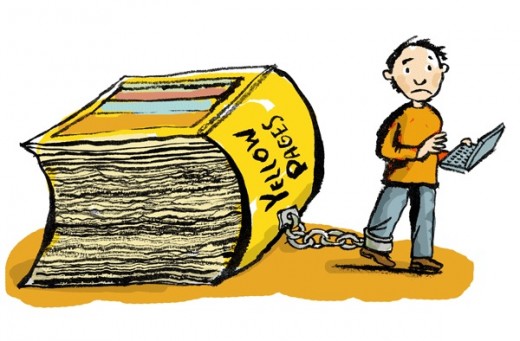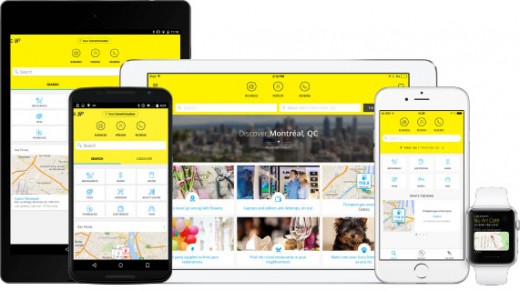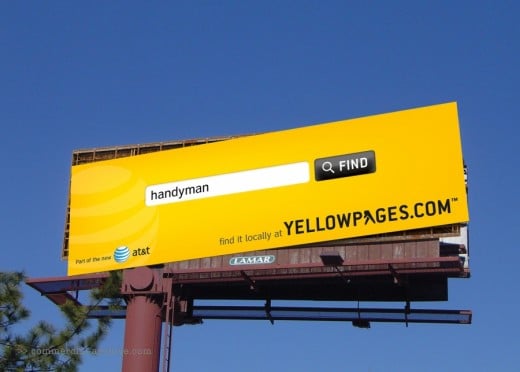- HubPages»
- Business and Employment»
- Small Businesses & Entrepreneurs»
- Marketing for Small Business
How Yellow Pages Are Hanging On in a Digital Age

Are Yellow Pages Still a Viable Form of Advertising?
When was the last time you opened up a yellow pages book, or any phone book at all? The last time I did was a few months ago when I saw one sitting on my doorstep. My first thought was "what a waste, I'm throwing this right in the trash...or maybe the recycling so it's slightly less of a waste". But instead my curiosity got the best of me, and I brought it inside. I wanted to see how many companies were still paying to have their listing in the actual book, and who they were. Having a background in digital marketing, I was intrigued by the size of the book and all the suckers that must have paid for all the ad space in there to have made still somewhat sizeable. It was nowhere near the size of the books I remember delivering as a teenager one summer to earn money for Boy Scout Camp, but in my mind it should have more closely resembled a magazine than a phone book. "Who are all the businesses filling this thing up? There can't be this many retirement communities and electric wheelchair vendors in the area" I thought. I hadn't used a yellow pages book to find a business for about a decade, and was under the impression that the only people that would are those who are internet illiterate.
But to my surprise, on of the main ads on the front cover of the book was for the Dallas Mavericks, the local NBA team. Still I thought that was only because old guys can spend a lot of money on sports, and an NBA franchise had the marketing budget to blast their logo any and everywhere. However, I did also notice that two of the other front page ads were for a walk-in jacuzzi tub, and an easy climber stairlift - which are both directly correlated to those of a retired age. The final front cover ad was for a personal injury attorney. Those guys will advertise anywhere they can, so no surprise there. Then I opened the book expecting to see more of the same. The entire inside of the front cover, including a little fold out flap, and the whole next two pages were a giant ongoing ad for different attorney/law firm that seem to also specialize in personal injury as well as divorce and bankruptcy. The entire back cover inside and out was more of that same law firm. They must know something about the frequency of legal troubles of those who use yellow pages books that the rest of us don't know. That's five full pages, plus a fold out flap of the front cover, of brightly colored and bolded text ad. Only they know if it all was worth the cost. But then I started flipping through the actual yellow pages.
How useful yellow pages used to be.

Majority Demographic of Yellow Page Book Users
After flipping through the entire yellow pages, I noticed a few things. There were a few categories that seemed to have the vast majority of paid ads - you know, anything more than just the standard small print text listing of just name, address, and phone number. Home products and services, lawyers, loans, medical services and equipment, insurance, and financial/tax services made up an overwhelming percentage of the ads. When I went through the sections for restaurants, hotels, clothing stores, and other retail locations, it was a sea of small text on plain yellow pages. In these sections there were more ads by YP themselves advertising to businesses to buy ads than there were ads from the businesses that belonged to that category.

This led me to a few natural conclusions.
- Many of these ads are definitely targeting those who don't have the tech skills to find these things online (Read: older people). Think about the categories I mentioned that had a huge percentage of the paid ads. Many of them cater to a more elderly age. Medical equipment and services, while not exclusive to those of advanced age, certainly are used much more by them. Some of the home services advertised such as lawn care, gutter cleaning, window washing, and others are probably purchased more by those who own homes, but aren't feeling up to doing those tasks themselves. That indicates either a lack of ability or a certain level discretionary income - both of which increase as you get older. While many of the services are things that most any homeowner would need professional help with, just owning a home these days also lends itself to having more income and years behind you.
Financial planning for retirement is definitely something that weighs on your mind the more the years go by.
Life and medical insurance are also more likely to be thought about as you climb the ladder of life. When people retire, they often go from having insurance through their employer to having to procure it on their own.
I was surprised to not find more thana few smaller ads for assisted living and retirement centers. But then I remembered how things went with my own grandma. Most of the time it's the children of the elderly person that handle the research and decision making of those things when it get to the point where they are needed. - A lot of ads are geared towards those of lower income that might not be able to afford internet in their home and/or a smartphone with a data plan - the two invisible hands pushing yellow pages beneath the surface of the waters of viability.
Looking for loans in the yellow pages? That indicates not having an established relationship with your bank to secure a loan, or the credit history to easily facilitate one.
Immigration attorney ads speak for themselves. Workplace injury lends itself more to those who engage in manual labor employment. Bankruptcy legal help is kind of a no brainer here. And "Se habla Espanol" on almost every legal services ad shows that they are also targeting the immigrant market that likely has less of a budget for internet in the home and mobile device.
The high number of tax and IRS help ads would also indicate a lack of internet available funds. - If it's something you're likely to look up on the go, you won't find many paid ads for it in the yellow pages book. As I mentioned earlier, restaurants, hotels, clothing and other retail stores have next to 0 paid ads in the yellow pages. Not only do these indicate at least a little bit of discretionary income, but they can tend to be looked for while on the move - which means likely on a mobile device. These are also places where people like to see reviews and more detailed information at a glance. The yellow pages book just isn't going to provide that.
While I wouldn't say that all of the paid ads were specifically targeted to the aforementioned demographics, it's pretty obvious that they are targeted much more than others. So are yellow pages dead to the rest of the population?

Do You Use Any Form of Yellow Pages?
What form of yellow pages have you used in the last year?
Where have all the yellow pages gone?
The simple answer is no. Well, at least not yet. See these yellow page companies have made a lot of money over a long period of time, which means they have a lot of employees, including marketing departments. And a while back, they noticed this whole internet thing was taking a big chunk of their businesses. This is when we saw the debuts of online yellow pages like yp.com, yellowbook.com, or even companies that started as digital-only options like tapyellow.com that actually debuted first as a mobile app in the first days of the iPhone.
But as the years continue to go buy, so do the use of even the online yellow pages. A quick look in Google trends shows that people searching for "online yellow pages" and other popular varieties of that phrase have dropped quite a bit over the last several years. This is probably due to the fact that Google, Bing, and Yahoo themselves have built up a better version of yellow pages. The results are far less dependant on who is paying the most. While there are definitely the paid results at the top of most searches, the map for local businesses and organic results of your search are right there as well. Within a click you can instantly see all the information you want to know about your different options, see what other people think about them, and get directions to get there. This is more convenient for everyone, but especially for mobile users.
Yellow page companies have been playing catch up and trying to offer these same features with varying levels of success. But most people just decide to cut out the middle man. They already use Google, Bing, and Yahoo to search for everything else they have questions about, and many use them for email, news, and other services. Oftentimes it becomes a question of convenience. And that is a big factor in today's world.
So is it just a matter of time and slow death for yellow page companies? Probably, unless they find some creative ways to pivot there business strategy. But it's going to take a while. According to YP chief marketing officer Allison Checchi, YP made over a billion dollars in online revenue in 2014. Yes, that's billion with a 'B'. And surprisingly it was the first year that YP had more money coming in from digital sources than from print. That's the part that really surprised me. I've worked with enough small businesses who have thrown dollar after dollar at online yellow page ads to know they were still making a good amount of money through digital means. But to hear that they are just starting to make more money online than the actual printed book ads was a shocker. I'm no mathematician, but that should equal close to 2 billion dollars in revenue. That doesn't compare with Google or Microsoft(Bing), but it's more than enough to invest in future business strategies. That just goes to show you the amount of spending power the baby boomers and beyond have in this country. That is slowly diminishing, and more people of advanced age are learning this whole internet thing, but it's not going to happen overnight. It'll be a gradual process that will take years.
So for now you're still likely to get a phone book dropped off on your doorstep at least once a year from the major players in the industry, depending on your area. And if you own a business, they'll still offer you the ability to purchase online advertising packages to reach that shrinking market as well.

Advertise through us, but not with us. Wait, what?
One of the ways YP and other yellow page companies are adjusting to the new digital landscape is the old strategy of "if you can't beat 'em, join 'em". YP received Google's 2014 North America Premier SMB Partner Award for Highest Growth, awarded to Google AdWords' top SMB partner with the highest new AdWords revenue from new accounts. They actually sell packages that include listings on Google, Bing, Yahoo, and Yelp, plus a few others. That definitely provides an allure to continue to do advertise through YP.
But wait, doesn't that make them just a middle man? Pretty much. In fact, it essentially turns them into a digital marketing agency that just so happens to have a printed book as well. You know, if you're still into that sort of thing.
So then the question becomes "Is YP or another yellow page company who you want to be your digital marketing agency?". After all, there are many agencies out there like Yellow Pages Digital and Movement Marketing that specialize in small and local businesses, and don't have the often bloated prices of a larger company. The answer to that question can only come from each business owner or decision maker. But there are a few things to consider. Like the fact that for some services like SEO, they turn around and sub contract that work out to an agency that specializes in it. And that probably means you're paying more than you could be if you went directly to that company, since you have another layer of mouths to feed. Now sometimes these agencies will give big partner companies like the various yellow pages providers a good discount since they're bringing in bulk business. This could sometimes even things out price-wise, depending the exact numbers. Are they as good or experienced as other digital marketing companies in managing a digital marketing campaign? Does having a bigger company provide any extra benefit? These are all questions to consider and find the answers to in your specific situation.
So no, yellow pages aren't dead. But the health of online yellow pages in on the decline, and printed yellow pages could quickly be on life support. Yellow pages apps are increasing the life expectancy overall, but modern "medicine" can only do so much for so long. When and if these yellow methods of advertising finally rest in their shallow grave, it will have been a long and gradual process to get there.








